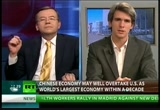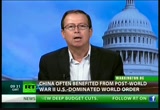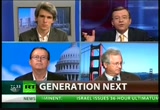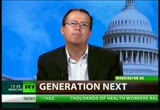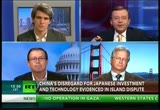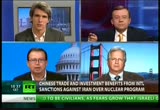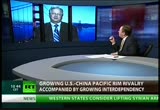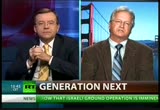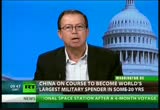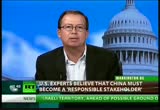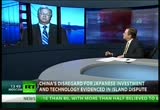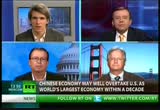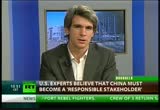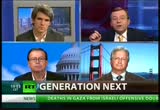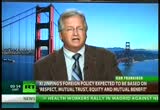tv [untitled] November 19, 2012 4:30am-5:00am EST
4:30 am
decision makers in beijing also know that this is the case they even know what their has to do to be done to reform and to balance but also most of the decision makers in beijing tell me that there is a problem with the leadership that the leadership is more fragmented than before cannot make it make up its mind about how it wants to implement these changes and that there is and i think this is essentially to stress that there is a growing tendency towards towards nationalism and that of course is going to shape china's position in the global scene it will have more domestic pressures as my my colleague already stressed and emphasized but it will also have more expectations from from the world the leaders will be stuck in between and have not much maneuverability at all to make concessions and compromises you know brian what do you think about the the element of nationalism because jonathan got ahead of me and i agree with him completely you know that that's something to let off a lot of steam when you begin to run into some kind of problems at home you can always you know work the foreign policy levers there and we've seen it's quite
4:31 am
effective with the dispute with the i want to speak with japan. well i think conventional wisdom or at least the main way this is being presented is that nationalism in china is simply sort of a way to let off steam or to channel discontent or to focus on others rather than internal problems but i think there is a deep seeded chinese nationalism that's based on the history the history of colonialism the history of occupation the history that's even a recent history where the united states and the western powers really are challenging china at all levels while of keeping a diplomatic facade still really challenging them the pivot towards asia and the dispute along the islands that die you islands where that is considered by china to be a provocation not just by japan but also with the complicity of the united states that of course stimulates nationalism which is sort of an authentic and genuine feeling
4:32 am
about the china from the chinese people that they don't want to be humiliated that they want their rightful place in the world that they want to be able to develop peacefully you know you do what do you think about the reason the chinese are they look at the united states and the united states has its monroe doctrine and one can japan have its equivalent on in its neighborhood i mean it is the rising power it will be the largest economy in the world. well i think for the chinese you know this. trying to manipulate and it may be. in some cases encouraged nationalistic responses to world events particularly in its near neighbors whether in central asia in russia or particular more recently in the south china sea the islands of japanese japanese islands you know what you do that's a difficult tire to riot and once you let it out of its cage it can spin out of control and the new leaders of china they're most worried about domestics bill and
4:33 am
he they need to keep that economy moving in order to control their domestic population and nationalism could be a very destructive force for the soul of the harmony that this new leadership seeks to. keep in place jonathan how does the new leadership balance those two issues continuing to grow the economy but to have more of an activist foreign policy i don't want to use the word aggressive but activist. well i think first and foremost is very important to stress that in the last decade or two decades or so political used to be in control of nationalism i think nowadays we are arriving at a turning point at which nationalism risks to get in control of politics and not the least foreign policy for me a century that brings china to to encounter two major challenges two major dilemma is the first is an economic development china is increasingly expected by its
4:34 am
neighborhood by countries like japan india to share part of its economic success story to make sure that for instance industrial development can also spill over their jobs can be created elsewhere but the chinese leadership is not good able to give in to that given the strong social pressures domestically the second challenge is more of a strategic security. and that's what that's that's the the wrangling over the pacific. it's rooted in history china has this agenda since the seventy's to try to break through the first and second island chain and eventually to turn potential aggressors not the least the united states for the united states of course it's completely the opposite it tries to stick its security perimeter as close to the eurasian continent as possible this wrangling these power placed on their turn of course will continue to engender a lot of frictions and competition with china's direct neighbors with south korea
4:35 am
with vietnam with japan and so forth brining i mean i guess you would want to say diplomatically but the united states is trying to contain china in every way possible. well i think the united states is trying to contain china limit china it's trying to move in and really compete aggressively with china i think that's what's happening with the island disputes i think that's what's happening in terms of the the missile defense shield in japan which is nothing other than a prescription for a potential first strike attack against china and i think china perceives it that way that the chinese government and the chinese society in general understands that china's rise is being confronted early on by japan but now principally by the united states what does the united states real agenda i believe that even though they see china as a large and expansive market where you can make mega profits alternately the hostility the decades old hostility of the rule of the chinese communist party in
4:36 am
china by washington policymakers as such that the u.s. will form of eventually a sort of a this integrating strategy in china to overthrow replace the chinese communist party using of course some legitimate grievances but ultimately trying to be stabilized china because they they consider is china's rise to be a direct threat to the world had generally by the united states that's how they view it drew i mean if you ok jonathan jump in but you know it's a large it will be the largest economy in the world very soon jonathan jump in yelling for the white house is this really has been a balancing exercise i don't really share the viewpoint of my colleague that is seeking sort of to topple the communist party would in china because it will be extremely risky from a security if you point from an economic viewpoint i think still the linchpin of america's strategy towards china is a sort of conditional engagement combined with with with deterrence and deterrence is of course
4:37 am
a very very difficult sensitive policy it combines sort of military muscle flexing to try to uphold military primacy in the western pacific but it also entails reassurance and i think for. at the time being still washington is putting a lot of. efforts to is making a lot of efforts also to reassure china it is not trying to derail its growth but to some degree control it to make it manageable cater a tiny bit and then i got a clear answer about that i'd like to take issue with go ahead brian gray we're going to thirty seconds before going to buy go ahead. well i think we just have to yes the united states is reassuring china but if there is a domestic opposition in china similar to what happened in iran in two thousand and nine or what happened in syria or what happened in china in one nine hundred eighty nine with tiananmen you'll see it the whole western media and the u.s. government turned suddenly sharply to support that opposition against the chinese communist party that's an underlying part of the politics and i think the chinese government knows that ok brian let me jump in gentlemen we're going to go to
4:38 am
a short break and after that sharper continue our discussion on china stay with us . and if you. want. you know sometimes you see a story and it seems so you think you understand it and then you glimpse something else you hear or see some other part of it and realized everything you thought you knew you don't know i'm trying hard luck it was a big. blow to the. audience technology innovation all the least of elements from around russia
4:41 am
yes mobile before blogs could even though it's we have a lot of illegal call me groups of the callers who sued sluices also argues in the right enough to my mind it was like what many had that marriage wasn't forced marriage it's the smadi when i was fifteen yes you can liberate other when a you certainly can't do it through the barrel of a gun only affected social changes can be the afghans themselves ask again many women we believe going to spawn can not truly cross paths without the patient it's chemical position and that a construction but stop people in the obama administration talking about how much they care about the women of afghanistan it's not true they don't care about the
4:43 am
ily. a little. live. live. live. live. live welcome back to crossfire particularly well to remind you we're talking about china and its relationship with the world. live in a list started live ok drew i'd like to go back to you in san francisco you heard our two other guests before we went to the break
4:44 am
would you like to take a side there the nature of containment of china. well i think one issue i would take it you know one aspect i take issue with is the idea that the u.s. is unified in its view on china i think there are very deep conflicting views who curse we just went through electoral process the united states in which both parties were competing to see who could stand up to china but really the issue is sitting down around the table and dealing with this enormous economic imbalance that way the trade imbalance and debt and there's a great deal of anxiety there's a great deal of. uncertainty on how to really tackle some of these deep trade problems without upsetting the balance that with the strategic balance that we've achieved in the pacific so there does not seem to be any sort of clear pinion on which direction to take now and china they just had
4:45 am
a selector roll process not an electoral process in which they picked their new seven leaders and clearly for them domestic issues keeping that country together keeping it on track keeping are growing at a pace that will solve many of its domestic challenges i take. my colleague susan shirks description of china's it's a very fragile superpower it is not the kind of threat that was often portrayed in the last election but of course that sort of idea of stain of china was preaching to our domestic audience and wish there is i think a great deal of of popular concern about jobs and about the u.s. economy and its dependency now on china ok jonathan jump in go ahead and brussels i think essentially on the two sides of the pacific we have fragile powerless and we have a deficit or economic model on the american side and we have
4:46 am
a surplus investment driven economic model on the other side boat. have become unsustainable sort of fundamental challenge for washington and beijing is to try to rebalance the cause of development in a way that avoids all out trade wars and that especially prevents that economic free public anxiety is going to intermittent intermingle with nationalism and military power plays that would be really the worst case scenario for both parties know that notwithstanding it is clear that washington has become fairly frustrated with. the way the relations with china develop things haven't really worked out as expected so there has been some soul searching going on but the conclusion has been that there should be more engagement more engagement coupled with their with the parents and showing where direct lines are ok wait brian if i go to you i mean interdependency this is what's keeping it together right and if there is any gauge
4:47 am
minutes the terms and conditions that's what the chinese have a problem with sometimes. well right i mean let's also put the context the military context for engagement as well of course both militaries engage at some level they have some level of. sort of an agreement to do certain things but the united states spends a trillion dollars that's the real number for military expenditures china spends one hundred billion that's gone up but still it's about one tenth the size of the united states when you include all the other expenditures for defense in america that are not part of the pentagon budget at the same time the united states has invoked a number of punitive acts against china for so-called trade violations that was as you could see a popular item during the election campaign where obama and romney were were trashing each other trying to appeal to the american nationalist sentiment and at the same time the united states government was angry that china and russia unlike
4:48 am
in the case of libya refused to go along with the american plans to overthrow the government in syria so there's a lot of pressure on china that in order to have an engagement that's that's that's stable that the united states must have a preeminence in other parts of the world like the middle east but china is aware now after libya that completely appeasing the american foreign policy designs is in fact threatening china because once the regime change ball gets rolling right it just keeps growing and so i think the chinese have a recalibrate in their foreign policy especially because of the lessons learned in libya and in the middle east you know drew the the you need let me put you in san francisco it's very interesting the chinese and the russians just watch the americans the story themselves all over the world with their allies along with it you know i'm sure a city in beijing from now they want to go there really and the chinese should stay out of it ok just keep expanding their economy. well the chinese have had an
4:49 am
extremely extremely successful foreign policy particularly in the middle east. there are very close trade relationship with israel as well as all of the arab states and the gulf states of course china is much more dependent on middle east oil now than the united states and in fact the predictions by twenty thirty five the united states will be almost free will be free of gulf oil persian gulf oil so we're moving in a very different direction in our relationship with the middle east than china is but china has been very successful and maintaining those relationships that go way back some of the earliest states that recognize china in the forty's and fifty's were the arab states many of them socialist leaning baths on r.t. but also china is very troubled by its relationships in south asia particularly other problems between pakistan and india so it's a very difficult transition for this news lately leadership they have these
4:50 am
domestic challenges but they have to keep fueling that economy and they have and they need fuel and they can't keep relying on coal because what it's doing to their own environment as well as as well as their own sort of need to shift third station vellum it jonathan you want to jump in there. yes absolutely and what i think when you discuss with diplomats and officials in beijing they are and so positive about their own diplomacy at all china feels as a as a rising power without friends it's sees itself as a power that is challenged by public opinions and insecurity all over the world and it feels sort of trapped in the new people or order it's really desperate to find new allies and partners now is that of course inside elicits a very vivid debate in china industry at the age of community and here i think more or less you can discern two schools on the one hand you have faults who argued that
4:51 am
peace for allies is not viable and that china should become more assertive bolder in in defending its interests somewhat behave like the united states essentially and then you have another school stressing and pushing for a more conciliatory line more compromises also making more economic concessions especially to the neighborhood my take is that at this very moment most of the new lead leaders still side with with with the second strand with the to school of prudence but that still it remains to be seen whether the return of nationalism could push the first school the more assertive school to a new height ok it seems to me that china's foreign policy risk averse ok again you know they stay out of all these messes that the the united states and its allies go into when bankrupt them selves lose their credibility the chinese are stand on the stand on the sidelines and it's paying off. well in
4:52 am
some ways yes but there's a there's another issue that i think is developing and that's because of the asia pivot which the you know the republicans say that's a false pivot the united states isn't really turning towards the asia pacific but it is you're going to see as you said in the beginning a lot more ships a lot more of the u.s. navy and the air force in in the asia pacific and also the united states government refuses to sign the law of the season treaty because it has designs for the asia pacific for a mineral exploration and other energy exploration which puts it in a direct collision course with the chinese government's perceived interest not only for territorial sovereign control over certain islands but for the economic exploitation of the the ocean bed and so i think china is going to be confronted with a new problem in its own backyard which is going to be protracted and while the u.s.
4:53 am
is of course still focused on the middle east where two thirds of the world's oil and natural gas is this pivot is for real and i think it means that the chinese are recognizing that the confrontational element with the united states is unavoidable and that will give great way to those in china who say we should have a more assertive foreign policy because the confrontation is not going to end by appeasing the united states drew what do you think the chances are of confrontation in the next ten years and you've got to get over mineral resources about the economy right. well i i'm very skeptical of that idea i think it plays into this china threat lobby and it fuels domestic nationalism and i think it's very. you know there's no real substance to that military particularly in the pacific we so dominate pacific it's a course china is growing but what i think would what is clear is china is
4:54 am
a very pragmatic policy and it has pragmatic concerns and regions that china regards as its own it will defend but in terms of x. territorial expansion china i think has its hands full with these challenges such as to bat for example or the western regions of cian job let alone. challenging the united states outside of what china perceives to be its borders and if for example look at what's happened with taiwan and its growing relationship with china that's really no longer a major strategic issue for the u.s. military although of course. the taiwan issue constantly is is of great concern particularly when it leads to issues of democratization for the challenges within china and we see this political theater recently of this electoral process a giant. we begin to see the vast differences that does do separate the political scene in taiwan from china that's
4:55 am
a concern they don't want that kind of democratic process to sweep through their very tightly controlled very secretive selective process all right gentlemen mabel do this program ten years from now many thanks many thanks to my guest today in london washington and in san francisco and thanks to our viewers for watching us here see you next time remember prostitutes.
4:56 am
moshe's would be so much brighter if you knew about someone from funds to impressions. from stunts on t.v. dot com. kids in sorrow. and hope for escape. barely surviving longing for a godsend. they live in a search for gold. why doesn't it bring them wealth. mission free accreditation free transport charges free. range
4:57 am
limbs free risk free studio time free. download free broadcast quality video for your media projects free media. dot com. we speak your language. news programs and documentaries in spanish matters to you breaking news a little tentative angles keeping the stories. you hear. the spanish find out more visit. secret laboratory was able to build the world's most sophisticated robots which fortunately don't amount anything tim's mission to teach music creation why it
4:58 am
39 Views
Uploaded by TV Archive on

 Live Music Archive
Live Music Archive Librivox Free Audio
Librivox Free Audio Metropolitan Museum
Metropolitan Museum Cleveland Museum of Art
Cleveland Museum of Art Internet Arcade
Internet Arcade Console Living Room
Console Living Room Books to Borrow
Books to Borrow Open Library
Open Library TV News
TV News Understanding 9/11
Understanding 9/11